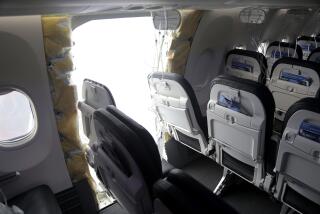The Wages of Deregulation : Does Public Safety Fly With Eastern?
The Justice Department has obtained criminal indictments against Eastern Airlines and nine of its managers on charges they failed to maintain passenger aircraft properly, then lied to conceal their negligence. The department’s announcement is a welcome sign of federal authorities’ willingness to attack a problem to which The Times first drew attention more than three years ago.
In March, 1986, Times writers Richard E. Meyer and Ralph Vartabedian reported that deregulation of the airline industry and a diminution in federal oversight forced by budgetary restraints had combined to seriously erode the commercial air fleet’s margin of safety. Their story documented not only the increasing average age and use of passenger aircraft, but also the decline in maintenance spending as an overall percentage of the airlines’ operating expenses.
As James M. Dimin, an aircraft engineering and maintenance expert hired as a consultant by The Times, put it: “Deregulation has been a disaster both in terms of its effect on maintenance practices and, ultimately, in its effect on safety.”
If the allegations contained in the government’s 60-count indictment of Eastern and its supervisors are proven at trial, the troubled airline’s situation will stand as a striking example of the threat to public safety created by the federal government’s sloth in arresting the trends set in motion by deregulation. “Thousands of innocent passengers may have been put at risk every day by the actions of these defendants,” Atty. Gen. Dick Thornburgh said in announcing the indictments.
Eastern, one of the airline industry’s most troubled carriers, has been the target of a strike by unionized mechanics for more than a year. As a consequence, the company has filed for protection from its creditors under Chapter 11 of the Federal Bankruptcy Code.
The government charges that between July, 1985, and October, 1989, officials at Eastern’s Miami headquarters, who were themselves under intense financial and competitive pressure, intimidated supervisors at maintenance centers in New York and Atlanta “to keep the aircraft in flight at all costs.” To that end, the government alleges the supervisors failed to inspect fuel tanks, knowingly installed faulty cockpit gauges and improperly maintained landing gears, fuel systems, automatic pilots and radar. To conceal this conduct, the government says, they altered work cards and log books and forged other employees’ names to maintenance records.
Vigorous prosecution of such alleged conduct will, as the assistant U.S. attorney handling the case said, “Send a clear signal not just to Eastern, but to the entire airline industry.” It also ought to send a message to Congress and the Bush Administration that the government’s approach to airline regulation also is in need of preventive maintenance.
More to Read
Inside the business of entertainment
The Wide Shot brings you news, analysis and insights on everything from streaming wars to production — and what it all means for the future.
You may occasionally receive promotional content from the Los Angeles Times.










